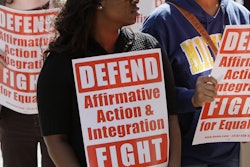People of color are earning advanced degrees at a pace that exceeds
that of Whites, but can the pipeline’s momentum be sustained without
affirmative action?
With hardly any fanfare or notice, the last five years have seen
unparalleled growth among what has been called the credentialed class”
of African Americans, Hispanic Americans, and Native Americans.
Each of these groups has increased the number of master’s and first
professional degrees earned by leaps and bounds — growing by as much
as 10 percent each year (see accompanying table). However. the
unprecedented numbers of advanced degrees is being earned by people of
color just as attacks on affirmative action are raising the question of
whether access to higher education can be maintained.
Still, the sheer numbers are impressive.
“That’s an important trend,” says Dr. Margaret Miller, president of
the American Association for Higher Education, who notes that graduate
and professional schools are “where a lot of people are getting their
credentialing for professional work. That suggests a growing entrance
into the middle class.”
Dr. Christopher Foreman, senior scholar at the Brookings Institute, also is hopeful.
“I wouldn’t want to overstate it, but it’s a very encouraging sign
that once African-Americans make it into postsecondary education, they
can be successful in large numbers,” he says. And Dr. Troy Duster,
professor of sociology at the University of California-Berkeley, adds,
“One of the big issues is between credentialing and employment. If we
could see that people’s advanced degrees connect with the job market,
then it seems to be a significant development.”
Asian Americans have participated in this great movement forward as
well. But as a group, their educational success has been widely
heralded, while that of other people of color has gone unrecognized.
These unprecedented statistics emerged as part of Black Issues In
Higher Education’s annual “Top 100” listing, which ranks colleges and
universities on the basis of their advanced degree production among
Blacks, Latinos, Asian Americans, and Native Americans.
While people of color have surged ahead, White degree attainment
has staved fairly steady, except for a 2 percent annual increase in the
number of master’s degrees earned. This is likely attributable to a
demographic trend known as “the baby bust,” which has resulted in a
shrinkage in the pool of White students who are of traditional
college-going age.
This steadiness among Whites makes the large increases in the
numbers of people of color earning advanced degrees even more dramatic.
“There is a big picture here, and it has a name opportunity,” says
Dr. Edgar Beckham, coordinator of the Ford Foundation’s Campus
Diversity Initiative. “The surge in undergraduate enrollment is
beginning to produce a surge at the upper levels.”
Pinpointing the Concerns
“That’s good news,” says Dr. Reginald Wilson, a professor of education at the University of Texas-Austin, of the surge.
However, Wilson offers a word of caution.
“[The data] need to be broken down by discipline and then you can
see where the increases are occurring. I would surmise that most
[master’s and doctoral degrees] are going to public school teachers,
not to people who are going to be in the academy,” he says.
One of the top granters of master’s degrees to African Americans is
NOVA-Southeastern University in Florida, which, according to Wilson,
mostly grants degrees in education.
This is not necessarily bad, Wilson hastens to note.
“I started life as a public school teacher,” he recalls. “One of
the incentives for me to receive a master’s was to increase my salary.
Then I went on to get my doctorate and I was ruined for public school
teaching.”
However, Wilson insists, “All these education doctorships don’t mean anything if you don’t get into the academy.”
Wilson warns further that with the attacks on formal affirmative
action policies. the number of people of color earning advanced degrees
could drop.
“Overall enrollment has not declined, but enrollment in law,
medicine, science, and mathematics has — particularly in Texas and
California.”
Ford’s Beckham has a slightly different concern.
“I worry more about people backing away from their affirmative
interest than the laws,” he says. “[Changes in the] laws may cause some
problems, but what has moved this whole thing forward has been
affirmative interest in making higher education more inclusive. If that
interest slacks, that will slow progress.”
In fact, the Association of American Medical Colleges has been
sounding an alarm about the receding number of Blacks. Latinos, and
Native Americans applying to and enrolling in medical school for the
last two years (see story on page 8). The drop has led some people to
think the pipeline to advanced degrees for people of color is closing.
“Closing is maybe too strong, but it is constricting,” says Dr.
Jordan J. Cohen, president of the association. “Just looking at the
matriculation numbers, we peaked in 1994 with 2,000 [underrepresented
minorities] out of 16,000 [new medical students]. That was the
high-water mark. The following year, it was unchanged. For the last two
years, there has been an absolute reduction. The class admitted in 1997
had 1,770 underrepresented minorities. So we’ve fallen back
significantly.
“There’s very great concern,” adds Cohen. “There’s no doubt that it reflects a retreat in affirmative action.”
Affirmative action has been under attack all over the country, but
the states of California and Texas are under legal mandate to end all
affirmative action based on race and ethnicity in college and
university admissions.
UC-Berkeley’s Duster is very anxious about the effects of the legal end of affirmative action in California and Texas.
“The pipeline for medical schools for African Americans. Hispanics,
and Native Americans is colored by these two facts: If you take out
[historically Black] Xavier” and Howard, the schools that produce the
most medical students are the University of California-Berkeley,
University of California-Los Angeles, and University of Texas-Austin.
What that means is that three of the non-traditionally Black colleges
have been impacted in dramatic ways” by the end of affirmative action,
Duster says.
“I tell people I don’t need a conspiracy theory,” he adds. “I just look at what happened.”
Peter Syverson, vice president for research at the Council of
Graduate Schools, says it is too soon to predict what effect attacks on
affirmative action will have on advanced degree attainment.
“We don’t have a good read on this yet. That’s peering way far down
the pipeline. All the affirmative action issues we’ve heard about are
at the undergraduate level. The word we have on graduate schools is
real mixed. But there’s a long pipeline to graduate study,” he says.
However, Syverson says, one problem is that UC-Berkeley, which has
been at the center of the affirmative action debate, has had a
tradition of building a constituency for graduate school.
“So the concern is: if there are fewer minorities at Berkeley, then there might be fewer graduate students,” he suggests.
Counteracting the Effects
However, Syverson add, “It’s quite conceivable that you could
counteract any decreases in the pipeline with concerted retention
efforts.”
Although the medical school enrollments are down, enrollment of
minorities in graduate schools continues to be strong overall,
according to Syverson.
“The rate of increase in minority enrollment is going down a little, but the numbers are going up,” he says.
But, the current strength of the economy could change everything.
“I’m kind of on the edge of my seat to see what students will do,
particularly if the job market stays strong,” Syverson says.
Generally speaking, when the economy is strong, the enrollment in
graduate programs drops. This is particularly true in the engineering
and science fields.
Don Brown, the dean of special programs at Rutgers University-New
Brunswick, has been recruiting minority students into graduate programs
of engineering for twenty years. He begins by working with high school
juniors and seniors from throughout New Jersey with summer programs.
Ordinarily, he says, recruiting students for graduate school is easy
once they’re hooked on the college experience. He points to many of his
former students who now hold doctorates.
“The only problem — if there is a problem — is that we’re competing with these huge salaries,” he says.
Brown’s program is one of many that have been developed over the
past decade that, in the words of Deborah Carter, head of the Office
for Minorities at the American Council on Education, “are beginning to
bear fruit” in terms of the degree attainment among people of color.
“[No] single program is important, but a whole flock of folks
[running programs] are getting two or three people in each year. That
demonstrates what can be done,” Brown says.
The anti-affirmative action atmosphere, which is beginning to creep
into New Jersey, worries Brown. The major state program under which he
operates, the Equal Opportunity Fund (EOF), has had level funding for
the last few years. About 60 of the school of engineering’s 580
incoming students are from the EOF program.
Sensing the shifting political mood, Brown changed the name of the
program to Engineers of the Future. He has been amused to notice that
the new EOF program has had calls from professors who had never before
shown any interest in it and who are now proposing joint projects with
his Students.
“We’re going to have to market [our programs] a little
differently,” Brown says. “I think programs nationally have to do that.”
COPYRIGHT 1998 Cox, Matthews & Associates
© Copyright 2005 by DiverseEducation.com















